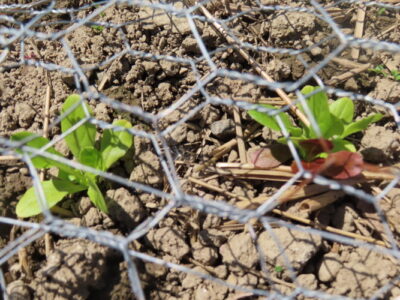“What is eating my plants?” is a question that thousands of gardeners ask yearly. Unfortunately, realizing that your plants have become someone’s meal is the easy part. Discovering who the culprit is may take a little detective work. From the tiniest bugs and slugs to rabbits, deer, and even coyotes, our gardens can fall prey to all sorts of plant “predators.”
With a little common sense and some know-how, it is possible to rid your garden of unwanted pests, large or small. This article will discuss some of the best and most affordable tips to protect your garden so that you and your family can once again enjoy the taste of freshly grown fruits and vegetables.
A Gardener’s Job
Your garden is an entire ecosystem taking place right in your backyard. From unseen microbes and wriggling earthworms just below the soil surface to the honeybee pollinating your newly planted raspberry bushes, your garden has a naturally occurring balance of good and harmful “pests.” The gardener’s job is not only to care for and nurture the plants but also to care for and nurture the beneficial bugs and microbes living there. Therefore, when ridding the garden of harmful pests, avoid using pesticides, herbicides, and other chemicals, as they can harm beneficial bugs such as honeybees.
Bugs

When asking, “What is eating my plants?” If you have small holes in leaves of plants, you are probably dealing with a bug problem. The list of insects that eat plants is long, so let’s run through some of the most common species.
- Aphids
- Asparagus Beetles
- Bagworms
- Cabbage White Butterfly Caterpillars
- Cutworms
- Grasshoppers
- Hornworms
- Japanese Beetles
- Sawfly “Caterpillars”
- Slugs
Even though eliminating bugs from your garden is impossible, reducing the number of harmful bug visitors is possible.
- Grow hardy disease-resistant plants: Bugs know which plants are healthy and which are not and tend to destroy the weaker plants.
- Attract beneficial bugs to your garden: Assassin bugs, earwigs, lacewings, ladybugs, praying mantis, ground beetles, soldier beetles, two-spined soldier bugs, and garden spiders are just a few beneficial bugs that eat many harmful bugs and their larvae that prey on many plants.
- Repel harmful bugs with plants: Planting herbs and other strong-smelling plants around the garden perimeter and throughout the garden can repel many bugs. Think strong-smelling herbs such as basil, fennel, lemongrass, mint, and yarrow. Intermittently planting marigolds with vegetable plants can also repel bugs.
- Spreading crushed eggshells around the garden perimeter can help deter crawling bugs such as slugs.
- Get ducks: If slugs are a problem in your garden, enlist the help of some web-footed friends. Ducks love slugs and will happily devour any slug they can find. Before purchasing ducks, check with your local zoning ordinances to see if ducks are legal where you live. Always supervise ducks to be sure they don’t eat your vegetables or berries.
- Pick and freeze: Picking bugs off the plants is something gardeners have been doing for centuries. Place bugs in a freezer-safe bag and store them in the freezer for 24-48 hours before discarding.
Birds
Deterring birds from your garden can cause the gardener more harm than good. A natural predator to many garden pests, birds benefit gardeners in many ways. Unfortunately, birds will sometimes feed off of berries and tender young plants. Try the tips below to prevent birds from harming your berries or plants.
- Cover seedlings with old milk, vinegar, and water jugs. Wash the milk and vinegar jugs carefully before using them. Cut off the bottom of the milk jug and place it on top of the seedling. Push the milk jugs down slightly into the soil to keep them from blowing away. Or you can cover seedlings with hardware cloth or chicken wire.
- Use bird netting over berry plants, shrubs, and fruit trees to deter birds from eating the fruit.
- Build a bird paradise to attract birds away from the garden. Include birdhouses, feeders, and even a bird bath. Be sure to place the bird sanctuary as far away from your garden as possible.
- Build a scarecrow: Whether scarecrows work is a personal opinion, but many gardeners swear by them.
Rabbits

You have crossed bugs off the list, but your plants are still getting destroyed. Which has left you pondering, “What’s eating my plant leaves?” The likely culprit is probably rabbits. So the next question may be. How to get rid of rabbits without killing them?
The good news is that rabbit-proofing your garden doesn’t have to be difficult, as rabbits can be very easy to deter. While there are many ways to discourage rabbits from your garden, the list below contains some of the most proven.
- Introduce Predators: Rabbits are prey animals to many creatures, including the family dog. Allowing your dog access regularly around the garden perimeter may be enough to deter any rabbits from coming to your garden.
- Reduce Nesting Sites: Keep your garden tidy by regular weeding and removing any low shrubbery branches to reduce the chance of rabbits nesting.
- Install Rabbit Fencing: Rabbit fencing is easy to install and requires only a few tools (wire, metal or wooden stakes, hammer, and shovel). Rabbit fencing should have one half-inch – one-inch mesh, be two feet tall, and be buried at least six inches underground.
- If rabbits are only after a specific plant, wrap chicken wire around the plant to avoid any more destruction.
How to Keep Deer Out of Vegetable Garden

The first thought in a gardener’s mind when they wonder, “What is eating my plant leaves?” is probably not a deer. However, deer eat many plants and are notorious for destroying not just your garden plants but also shrubs, bushes, and fruit trees. While they may be one of the most challenging creatures to keep out of your garden, it is possible to deer-proof your vegetable garden.
- Cover plants with wire to deter deer from stepping on or eating vegetation.
- Plant Deer repellent plants: Traditional medicinal plants with a powerful smell, such as (but not limited to) oregano, mint, yarrow, purple coneflowers, marigolds, and lavender, may help to deter deer from the garden.
- Building a ten – to twelve-foot fence is the best way to keep deer out of the garden. Wire gaps should be no larger than eight inches. You can also build a smaller four-foot fence to deter deer. When using smaller fencing, slant the wire outward at a forty-five-degree angle.
- Purchasing several solar-powered ultrasonic animal repellents with motion-sensor LED lights and placing them around the garden is another way to deter deer without breaking the budget.
- Hang wind chimes around the perimeter of your garden. The noise will help to scare the deer away. If you don’t have close neighbors, playing the radio at night can also help to repel deer.
- If you have a plant or two the deer are particularly fond of, try fencing in the individual plants. This technique is more affordable than fencing an entire garden if you don’t need to.
Coyotes
Are coyotes omnivores? Yes, they are. While most coyotes prefer to eat meat, they also enjoy fruits and vegetables from your garden. Coyotes are the number one predator of growing watermelons. So, if your watermelon is being eaten on the spot or carried away, chances are your garden thief is a coyote. Like all garden predators, the best way to protect your vegetation from coyotes is to deter coyotes from visiting in the first place. Due to their intelligence and athleticism, coyotes often jump or climb fences to get into your garden and have also been known to chew through and dig under fences.
However, it is possible to deter coyotes from your garden and build a fence to keep coyotes out. While nothing is foolproof to deter coyotes, following these suggestions should help prevent coyotes from gaining access to your fruit and vegetables.
- Deter nighttime visitors to your garden by installing solar-powered Nite Guard Lights.
- Building a coyote-proof fence around the perimeter of your garden is the most effective way to protect vegetables and fruit from being destroyed. When building or installing fencing, use a half-inch sixteen-gauge hardware cloth. Fencing should be at least eight feet tall, and the last fifteen inches should be bent outward at a forty-five-degree angle to prevent coyotes from jumping over the fence. All fences should be topped with coyote rollers to deter climbing. Burying the wire one foot under the ground should help discourage digging under the wire to gain access to the garden.
Need more help deterring pests and animals from destroying your plants? Check out the two quick lists below.
How to Keep Animals Out of the Garden
The best ways to avoid unwanted visitors in your garden checklist include:
- Garden Fencing
- Provide an alternative source of food
- Raised garden beds
- Add windchimes
Best Animal Repellents for Gardens
Check out this quick checklist for a way to repel animals from your garden.
- Add some Ultrasonic Pest-repellent
- Plant mint and marigolds around and throughout your garden
- Hang soap around the perimeter of your garden
- Sprinkle cayenne pepper around and on your plants
So, what is eating my plants? A lot. But with the proper tools, it is possible to repel pests and animals from your garden so you and your family can enjoy the fruits of your labor.
Erin Snyder lives in the Northeast with her family and flock of pet chickens. You can follow her at her gluten-free blog: Kristi’s Country Kitchen
Sources
- https://dengarden.com/gardening/Whats-Eating-Your-Garden-Leaves
- https://gardens.theownerbuildernetwork.co/2021/03/17/7-harmless-ways-to-keep-birds-away-from-your-vegetable-garden/
- https://thanoshome.com/how-to-get-rid-of-rabbits/#What_Is_A_Natural_Rabbit_Repellent
- https://www.bobvila.com/articles/how-to-keep-animals-out-of-the-garden/
- https://savvygardening.com/deer-proof-gardens/
- https://northamericannature.com/what-do-coyotes-eat/
- https://animalhype.com/mammals/what-do-coyotes-eat/
- https://www.uaex.uada.edu/counties/white/news/horticulture/coyotes-eating-melons.aspx




